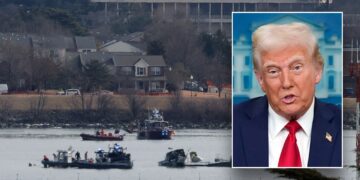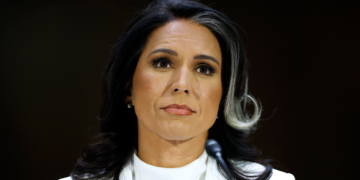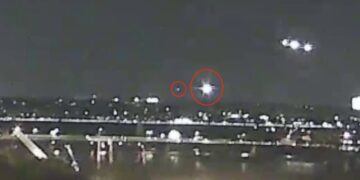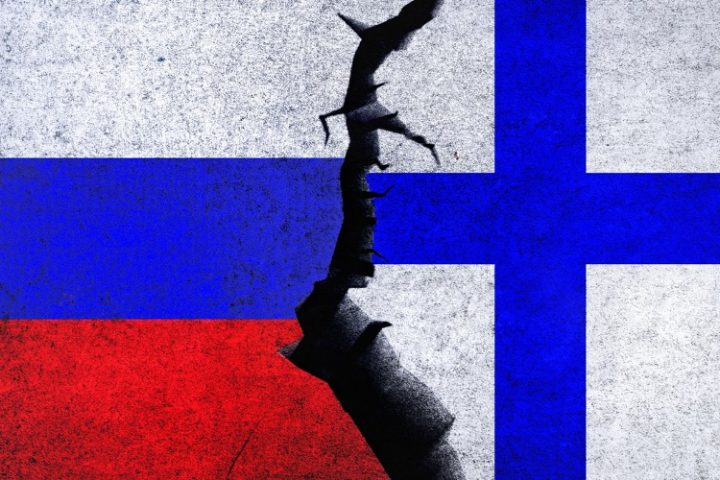
On December 17, during an interview with Russian journalist Pavel Zarubin, Russian President Vladimir Putin declared that his country will set up a new military district to reinforce its positions near Finland following the latter’s move to join NATO, stating that although Helsinki has not had any real “trouble” with Moscow for decades, from now, it will.
“They took and dragged Finland into NATO. Did we have any disputes with Finland? All disputes, including those of a territorial nature in the mid-20th century, have long been resolved,” Putin posited, pointing out that Russia does not have territorial disputes with any NATO member state.
Putin added that NATO itself is well aware that the Kremlin harbors no such plans of attacking NATO.
“Russia has no interest — geopolitically, economically or militarily — in waging war against NATO,” Putin stated, rebuffing recent claims by U.S. President Joe Biden that Moscow might attack if it wins the Ukraine conflict as “nonsense.”
“I think that President Biden understands that this is just a figure of speech to justify his misguided Russian policy,” the Russian leader stated.
To tackle NATO’s enlargement, Russia is scheduled to establish the brand new Leningrad Military District. As the name indicates, the new force will be based in Leningrad Region in the northwestern part of the country, where the city of St. Petersburg — known as Leningrad under the Soviet Union — is situated.
“There was no trouble. Now there will be. We will now create the Leningrad Military District and concentrate certain military units there. Why do they need this? It’s just nonsense.”
Prior to Finland’s move to become a NATO member, both Helsinki and Moscow enjoyed “the most cordial” relationship, Putin added. The only “minor trouble” Moscow and Helsinki have had was business disputes pertaining to the timber-processing industry, the Russian president said.
Finland proclaimed its decision to join NATO months after the conflict between Ukraine and Russia intensified in February 2022. In April of this year, the country became a full-fledged member of the U.S.-led bloc. Moscow has repeatedly warned that Finland’s decision was “wrong” given the fact that the neighboring countries had not had any unresolved bilateral problems.
Last week, Helsinki revealed plans to sign a Defense Cooperation Agreement (DCA) with the United States, permitting Washington to station troops and stockpile weapons and ammunition in the country (except nuclear weaponry).
Defense Minister Antti Hakkanen said that although the DCA did not exclude nuclear weapons, the agreement would not override the Finnish Nuclear Energy Act, which bans the import and possession of nuclear weapons on the country’s territory, as per reports by Finnish broadcaster Yle.
Moreover, the United States can also maintain a permanent military presence and conduct regular exercises in Finland to enhance readiness to respond to or deter any future conflicts.
The Finnish-U.S. cooperation agreement, signed on Monday, December 18, would give the U.S. armed forces broad access across the Nordic country, to 15 facilities and areas — including four airbases, a military port, and railway access to the entire 1300-kilometer length of the Russian border.
Similarly, the Baltic nation of Estonia has also been overhauling its defense readiness, while recently staging a major military exercise on the strategically located Saaremaa Island, where local troops trained with newly dispatched French units.
Besides the French, the rotating troops within NATO’s Enhanced Forward Presence in Estonia entail British, American, and even Icelandic military personnel.
There are eight international battle groups within NATO’s Forward Presence program in total, with one in each member state on the alliance’s external border, and with U.S. troops being the only ones stationed in all of them.
Romania and Bulgaria, the two southernmost countries of NATO’s eastern flank, which have special strategic importance for having direct access to the Black Sea, have also been stepping up their defenses against Russia.
For one, Romania recently inaugurated a new air base, located a mere 70 kilometers from the Black Sea and some 110 kilometers from the Ukrainian border. This air base was built specifically to host the training of Ukrainian pilots on F-16 fighter jets.
In response, Moscow threatened Bucharest, saying that if any jets were to enter Ukraine from Romanian airspace, the latter would be regarded as a de facto participant in the Russia-Ukraine conflict.
For its part, Bulgaria is reeling from Putin’s statements during his yearly marathon press conference on December 15 when the Russian leader remarked that the entire Black Sea coast was under Russian control at one point during the Russo-Turkish War and the Treaty of San Stefano in 1878, even if just for a few months, until the Treaty of Berlin revised the borders in the same year.
For Sofia, which just destroyed one of the remaining vestiges of its Soviet-dominated communist past, Putin’s comments reeked of Russian imperialism.
“We must take such statements seriously, because, previously they sounded just like words, [but now] they look like a plan for action, so indeed, we need to be very careful,” Bulgarian Prime Minister Nikolay Denkov posited while in Brussels for the recent EU Council Summit.
“We need to look carefully [at] what Russia’s next steps will be and make sure we are ready for them,” Denkov added, explaining that he suggested greater NATO integration, ongoing modernization programs, and increased joint exercises within the country. “We need to be ready in case, God forbid, something happens,” he elaborated.
However, unlike Denkov, Hungarian Foreign Minister Péter Szijjártó indicated that Russia was of no immediate threat to NATO, including for those NATO members of the bloc situated close to Russia, as any attack would trigger an overwhelming response.
Speaking in an interview with French broadcaster LCI, part of which was uploaded on Szijjártó ’s Facebook page on December 17, the Hungarian minister was asked to respond to EU Commission President Ursula von der Leyen, who warned that after the end of the Ukraine conflict, Russia would threaten NATO countries.
“I don’t think that Russia would attack any NATO member state,” replied, explaining that most EU members are also part of the alliance.
Szijjártó asserted that the U.S.-led military bloc is “the strongest security and defense alliance in the world.” He cited Article 5 of the bloc’s treaty, which stipulates that if any NATO nation comes under attack, it will be interpreted as an attack on all members.
“I don’t think that anyone, not only Russia, would risk any attack against any NATO member state,” he highlighted.
When questioned on why the Baltic states and Poland disagree, the minister explained that some countries have “different histories and different geographic locations.”
“I don’t know what would be my position if I was in the geographic location of the Baltics [or Poland],” Szijjártó said, noting that Hungary has always respected their position and never tried to challenge it.
“This kind of respect should be given to every position of every member state. My problem is that this respect is very rarely given to the Hungarian position. This is unfair and weakens the European Union,” he continued.
On December 16, during an interview with Espreso TV, former Ukrainian prime minister Arseny Yatsenyuk said that meaningful talks between Ukraine and Russia will only be possible if the West shows readiness to fight Russia and obtain NATO membership for Ukraine.
Yatsenyuk, who headed the Ukrainian government in the first two years after the Maidan coup in 2014, proclaimed that negotiations with Putin at the present moment would be “unrealistic.”
Ukrainian President Volodymyr Zelensky has likewise maintained that the Russia-Ukraine conflict should be solved according to his so-called 10-point peace plan, which demands Russia’s withdrawal from all territories claimed by Kyiv, reparations from Moscow, and a war crimes tribunal. Last year, Zelensky also officially forbade any talks with Putin.
Yatsenyuk, who now chairs the Kyiv Security Forum, said he can “hardly imagine” a scenario in which talks between Kyiv and Moscow would give rise to Russia’s withdrawal of its troops and the payment of reparations, while Ukraine joins NATO and the EU at the same time.
Additionally, Yatsenyuk recalled how Russia requested long-term security guarantees from the United States and NATO in December 2021, shortly before the outbreak of military conflict in Ukraine. Moscow’s demands entailed averting the further eastward expansion of NATO, denying accession to the alliance of former Soviet states, and restricting NATO’s military activities close to Russian borders. Nonetheless, the West refused to explore Russia’s requests.
According to the former prime minister, NATO and EU member states should play the “very same game” as Russia did at that time and tell Moscow that “we’ve made a political decision, Ukraine will be a member of NATO. Full stop. We are not discussing this decision with you.”
“Within this decision, we invite you to sign a new agreement between Russia and NATO, a new agreement on conventional arms control in Europe, a new START agreement on the limitation of strategic nuclear weapons, a new agreement on cybersecurity,” Yatsenyuk went on.
When the Espreso TV interview host pointed out that Moscow would never agree to such terms, Yatsenyuk concurred, but maintained that such a move would place Kyiv and the West in a stronger position.
“To the world’s publicity, we will say this: ‘We wanted exactly this kind of negotiation with Russia, we offered them what we could, and Russia refused it too,’” the former PM stated.
Yatsenyuk then said peace talks would only make sense “if the West was ready to demonstrate such political will,” calling it “the establishment of a new world order.”
“I want the West to theoretically agree to this model and reaffirm the readiness to fight for the new member [Ukraine],” he stated.
Shop For Night Vision | See more…
Shop For Survival Gear | See more…
-
Sale!

Portable Mini Water Filter Straw Survival Water Purifier
Original price was: $29.99.$14.99Current price is: $14.99. Add to cart -
Sale!

Mesh Shooting Hunting Vest with Multi Pockets
Original price was: $59.99.$39.99Current price is: $39.99. Add to cart -
Sale!

Japanese 6 inch Double Edged Hand Pull Saw
Original price was: $19.99.$9.99Current price is: $9.99. Add to cart

















































